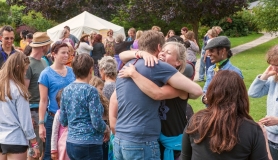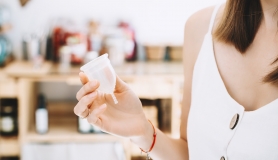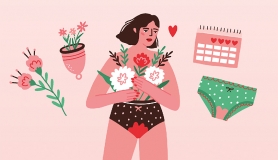Imagine not celebrating your daughter’s 18th birthday, her wedding or the birth of her first child. It seems ridiculous, doesn’t it, to ignore these pivotal moments in her life, yet we routinely ignore the very first step on the ladder of womanhood – menarche. But this is a defining moment and can have an enormous impact on her life. You may or may not remember when you first got your period. Maybe it was a joyous occasion, maybe it was a shock and you didn’t know what was happening or maybe it just seems a bit of a blur amongst all the other teenage dramas. I did not do puberty well. As a shy child, being one of the tallest in the school with a chest which seemed to explode almost overnight from nat-bites to a size D did nothing for my confidence. ‘My, haven’t you grown’ took on a whole new meaning during this time. I desperately didn’t want to grow up and saw the arrival of my period as the enemy, a sign that, no matter how much I wished, I couldn’t stop the inevitable move from girl to woman. I certainly didn’t share the event with anyone and I am sure the animosity I felt contributed to the many problems I experienced over the years, until I learned to live in harmony with my cycle. I’m sure most of us grew up in a house where periods were not discussed openly, let alone celebrated!
However, my recent participation in the first ‘Red Tent Day for Women’ organised by yoga therapist Rachel Hinton and Alexandra Pope, co-author of ‘The Pill: Are you sure it’s for you?’, has left me feeling not only more at peace with my own menstrual cycle but also feeling passionately that I want to make menarche a positive experience in my daughters’ lives. The ‘Red Tent Day for Women’ ended with a documentary called ‘The Moon Inside You’ by Diana Fabianova and another interesting talk by Alexandra. Mixing personal stories with humour, animation and interviews with various experts (including Alexandra) ‘The Moon Inside You’ gives a fascinating insight into the world of menstruation and the many conflicting views surrounding it, including a man who describes periods as ‘the sign of the devil’. It also features the enchanting Dominika, an 11 year old Slovakian girl who uses a camera as her personal diary to record her fears before (and including) the arrival of her first period. During the film, creator, Diana Fabianova talks about her own personal experiences and how, when growing up, talking about periods was a taboo which ‘far exceeded the scope of my family: it was all around.’ In making the documentary, she wanted to discover how ‘prejudices as stupid as “a menstruating girl can’t make mayonnaise” could possibly survive until nowadays?’ She goes on to say ‘Let’s talk about menstruation on our terms now. Let’s distinguish between what our society says about menstruation and what we really experience.’
Let’s talk about menstruation
It really is that simple to break down the taboos and ensure our daughters don’t inherit our prejudices. Puberty Girl is a great book by Shushann Movsessian who runs workshops for girls in Australia. She explains that ‘it is empowering to have the right information, to not have to hide who we are or feel embarrassed about it’. The problem I had was when to start breaking down the barriers and make menstruation a more open topic. Should I approach the subject one on one with my daughter or over Sunday lunch perhaps, whilst passing the gravy, or should I simply start leaving more of my ‘feminine products’ lying around in the bathroom in the hope that she might ask what they are for? All my kids have known about puberty since they were little but I had never gone into much detail feeling that it could wait until they were older. A bit like those sex conversations in which I covered the basic mechanics but left out details such as favourite positions.
At 9 my eldest daughter is getting older, I just keep forgetting. To be honest, in many ways I feel a little overwhelmed by the whole thing. I mean really it’s not that long ago that she was in nappies and learning to walk and suddenly I have to start on the big stuff. One of the biggest issues in today’s society is that girls are beginning to start puberty earlier than they used to. Instead of entering this phase of their lives at about 15, puberty can now start as early as 7 or 8 meaning it is vital that parents approach the topic early. After all, puberty is hard enough to get through without being unsure what is happening physically to you, let alone emotionally. Advice from friends about puberty conversations included things such as ‘answer all questions as honestly as possible or they’ll get misinformed by their friends’, ‘use a book’, ‘explain the different types of sanitary protection that are available such as pads, tampons or mooncup’ and, most importantly, ‘don’t look embarrassed’. With all of this whirling around in my head I grabbed a handful of tampons and my trusty Usborne book, ‘What’s happening to me?’, took a deep breath and went to ‘chat’ to my daughter.
Opening up to feminie intuition
At a time when children routinely pull away from their parents, puberty is a unique opportunity to create something special and if you can talk openly about menstruation with your daughters you will undoubtedly be able to continue this open dialogue through the years of boyfriends and sexual experiences. During puberty girls can begin to develop low self-esteem and become hugely self-conscious about their bodies, often because they are not being validated as women. This can lead to the desparation of anorexia, selfharming and substance abuse. While once our feminine intuition and connection to nature was heralded as a great power now it is often portrayed negatively. In teaching our daughters to embrace their femininity and menstruation cycle we are empowering them for the rest of their lives. As Alexandra says on her website; “positively presented information and knowledge of ‘menstrual signposts’ around puberty, and celebration of menarche, have a profound impact on body image, emotional health and menstrual experiences”. The knowledge that my daughter is approaching menstruation has made us even closer and following the first slightly awkward conversation we are now talking regularly about all aspects of puberty including nutrition and health and in particular celebrating menarche. Some of her friends are going to get their ears pierced but she has decided that she would like to celebrate by throwing a grown-up dinner party for her girlfriends. And while she has chosen her own way to celebrate, I have decided to create a menarche box to give to her, containing things such as a herbal pillow; a journal for charting her feelings; organic cotton pads; some red pants and a red ribbon to wear in her hair. I hope that she will continue to use this box each month, filling it with things that make her feel special thus creating her own unique self-care pack. In fact, I found the idea so inspiring that I have been busy making myself one!
Creating the red tent
However you decide to mark your daughter’s menarche make sure it is something she wants to do because she will remember it for a long time. Don’t rush off inviting the whole family if all she wants to do is turn her room into an unofficial red tent for a few days where she can retreat unhindered by the world around her. This is a time for you to increase the bond between you and the first step to this is listening to her needs and trusting her instincts. Red Tent day organiser and yoga therapist Rachel Hinton shared her insight into this exciting time, ‘My daughter is 10 and her energies are quite clearly shifting and changing. Although I have much to offer her, staying mindful that this is her journey allows me to follow and respond when there’s an opening or invitation from her to chat or share activities that enable her to express where she’s at. It feels like a time of staying close and supporting the connection between us without intruding or imposing my ways on her. Something that I find invaluable is gathering with other likeminded mums with similar aged daughters, sharing stories and ideas and just being there for each other. Having this kind of community feels essential for both of us.’
During the ‘Red Tent Day for Women’ Alexandra talked about ‘raising the red flag’ a phrase invented by a friend of hers who had plugged her friends cycles into her mobile so that she knew when to give them more support. This is something that some of my friends have begun to do and the idea of sharing our needs based upon where we are in our cycle is a wonderful concept to introduce to our daughters and can help deepen the parenting bond.
Although this is undoubtedly a unique time for mothers and daughters, it is critical not to exclude fathers. It can be hard for mothers to accept that their little girl is growing up, but many men see menstruation as the first step towards their daughters becoming a sexual being, something that most fathers greet with as much enthusiasm as an entire weekend watching Jane Austen. However, the way a father handles these changes can have a huge impact on her future relationships with men. Alexandra told me of a friend’s husband who sent his daughter the most enormous bouquet of flowers when she got her first period. Okay, she was a bit embarrassed but you just know that it is a memory that will stay with her and she will understand the significance in years to come. Don’t forget that boys often have questions about menstruation too so this is also the time when you should encourage any boys in your family to view menstruation as a positive experience for women so they can learn to be supportive in future relationships.
Nurturing ourselves
While ensuring that this time is special for our daughters, we must also remember that the best way to make her experience positive is to set a good example. Therefore it is essential to address our own menstruation prejudices. It can be hard to embrace our periods, after all when you’ve got terrible cramps, can’t sleep properly or feel like throwing things at the nearest person once a month, who wants to celebrate? However, charting your cycle and corresponding moods goes a long way to coping with, and even eliminating, these issues and at the very least means you know when to pack away your best china. If we, as mothers, gain a greater understanding of our menstruation cycle, and learn to live in harmony with it, then we are in a better position to pass on our wisdom to our daughters and show them what an amazing journey they are starting.
FURTHER READING
Puberty Girl by Shushann Movsessian
A Blessing not a Curse by Jane Bennett
Menarche: A Journey into Womanhood by Rachel Hertogs
What’s happening to me? by Usborne Books
The Seven Sacred Rites of Menarche: The Spiritual Journey of the Adolescent Girl
Reaching for the Moon by Lucy Pearce
Daughters in Flower Oracle Cards
My Little Red Book by Rachel Kauder-Nalebuff
First Moon: Celebration and Support for a Girls’ Growing Up Journey
USEFUL RESOURCES
More information about ‘The Moon Inside You’ documentary can be found at mooninsideyou.com






